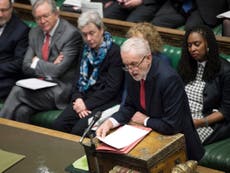Change UK had a chance to make a real difference, but its arrogance will be its downfall
Change UK styling itself as ‘the Remain alliance’ in the European elections while spurning Cable’s advances for a joint ticket was a mistake – Remainers have plenty of other options

When The Independent Group was riding high after eight Labour and three Conservative MPs quit their parties in February, one older hand warned its enthusiastic young recruits: “It won’t always be like this.”
They were right. The party now called Change UK enjoyed a brief honeymoon after its successful launch, but is now suffering from the media’s desire to “build them up, and knock them down”. The press has an even newer kid on the block in Nigel Farage’s Brexit Party.
Change UK’s roller-coaster first three months were perhaps inevitable for a party put together, as one founder put it, “by six people crowded into one office”. There were bound to be teething troubles. The media lapped up confusion over its logo. Two European parliament candidates who were not properly vetted had to be dropped over their past remarks.
The new party faces a huge challenge when it launches its manifesto for the European parliament elections in Birmingham on Friday night with a “charter to remain” in Europe, remain prosperous, healthy, united on climate change and stronger in the world.
Its original aim to swallow the Liberal Democrats looks impossible after Sir Vince Cable’s party made sweeping gains at last week’s local elections in England. The new councillors will enable the party to “dig in” in the parliamentary seats they hold, and potentially gain more. That is how the Lib Dems reached a peak of more than 60 MPs in the mid-noughties. More than 2,000 people have joined the party in the past week, taking it over the 100,000 mark. Its “bollocks to Brexit” slogan got its European election manifesto talked about. This is not the “ex-parrot” Margaret Thatcher pronounced dead when she mocked its yellow bird logo in an echo of Monty Python. (She didn’t get the joke, asking her speechwriters afterwards: “This Monty Python – is he one of us?”).
Initially, Change UK wanted “no mergers, pacts or alliances”. Some figures were influenced by David Owen’s opposition to the “new” SDP merging with the “old” Liberals in 1988; their combined alliance failed to break the mould as Change UK hopes to do.
Change UK styling itself as “the Remain alliance” in the European elections while spurning Cable’s advances for a joint ticket now looks arrogant. Remainers have plenty of other options if they are not convinced by Jeremy Corbyn’s shilly-shallying. The Greens also did well in the council elections and currently have three MEPs to the Lib Dems’ one. The welcome rise of climate change up the political agenda is bound to help them on 23 May. The other parties are suddenly talking about it, aware of the Greens’ USP. In Scotland and Wales, Remainers have the option of the SNP and Plaid Cymru respectively.
The proportional voting system used is better for smaller parties than first-past-the-post but its regional basis can still be cruel. Analysis by the Financial Times showed that if the Lib Dems, Greens and Change UK combined forces in England, they could win 16 of its 60 European parliament seats. But their decision to go it alone could reduce that to seven, which would all go to the Lib Dems.
Tensions between the Change UK and Lib Dem frenemies are high. As one Lib Dem MP put it: “They tell us in private how much they love us and that there are no differences between us, then say in public that we are part of the old broken politics.” Cable has pointedly told Change UK the lesson of the local elections is that parties cannot function without organisation and infrastructure: “there is no future sitting in London sending out messages”.
He said a new party could not repeat the success of Emmanuel Macron’s En Marche! in the UK because it does not have a presidential system.
There are signs Change UK accepts that it, too, will need to change to succeed. The party was prepared to field a joint independent candidate with the Lib Dems and Greens at the 6 June by-election in Peterborough, though it will not now fight the seat after the plan collapsed.
Change UK MPs hope that being “new” will enable it to become the “anti-populist party” that stands up to the likes of Farage. The danger is that Remain voters prefer the “old”, and the Lib Dems. Although time was very short, it would have been better to have agreed a joint Remain slate of candidates to turn the Remain vote into the maximum number of MEPs. Now, sadly, voters will probably have to do it by themselves through tactical voting. The campaigner Gina Miller has launched a Remain United website to encourage people to vote for the leading Remain party in their region.
Change UK needs to demonstrate on 23 May it has the “Heineken effect” and can win votes in parts of the country the Lib Dems and Greens cannot reach. That won’t be easy. It can still play an important part in securing the change we need, but it cannot be the star striker playing up front on its own, and is going to have to become a team player.



Join our commenting forum
Join thought-provoking conversations, follow other Independent readers and see their replies